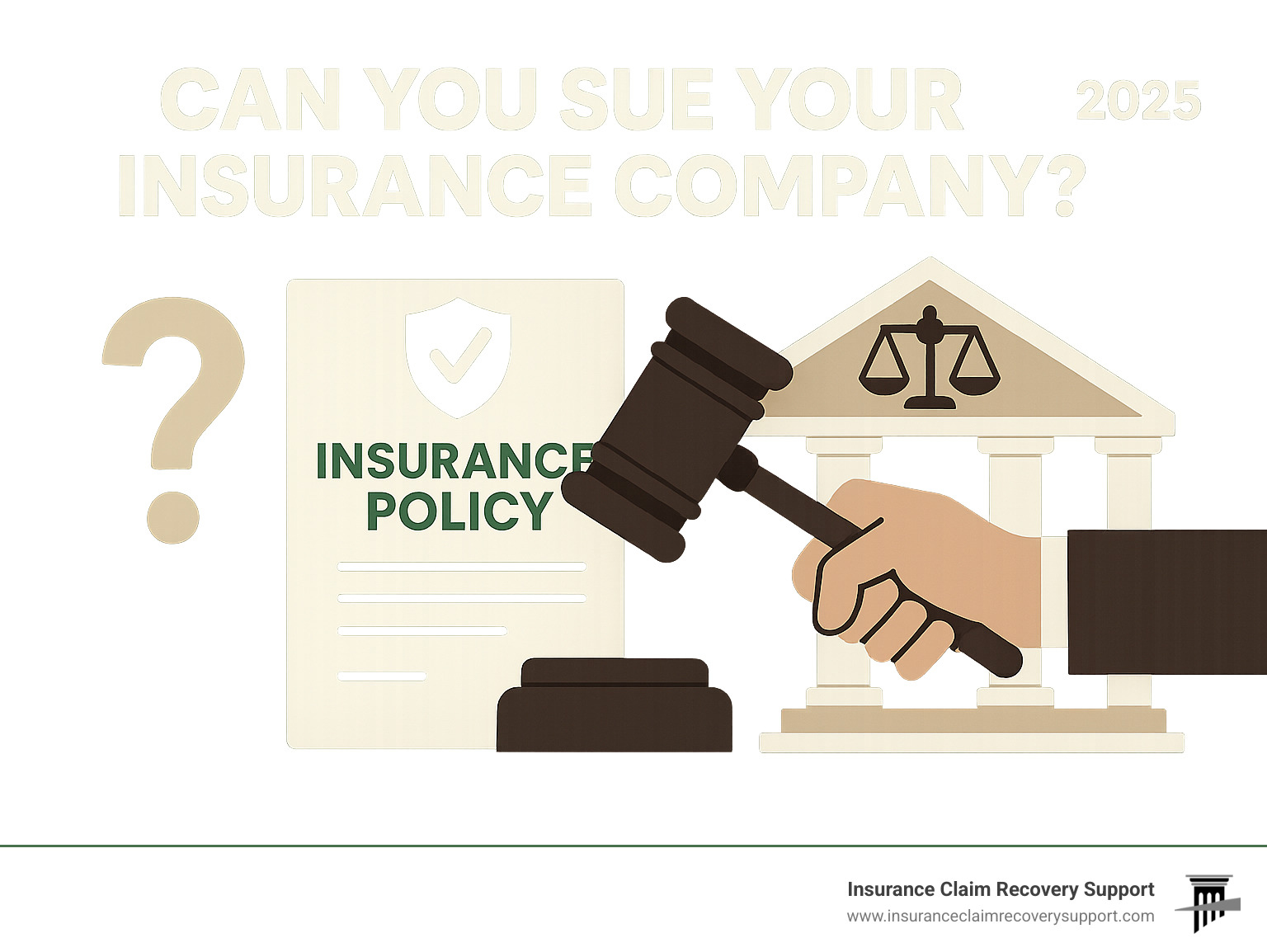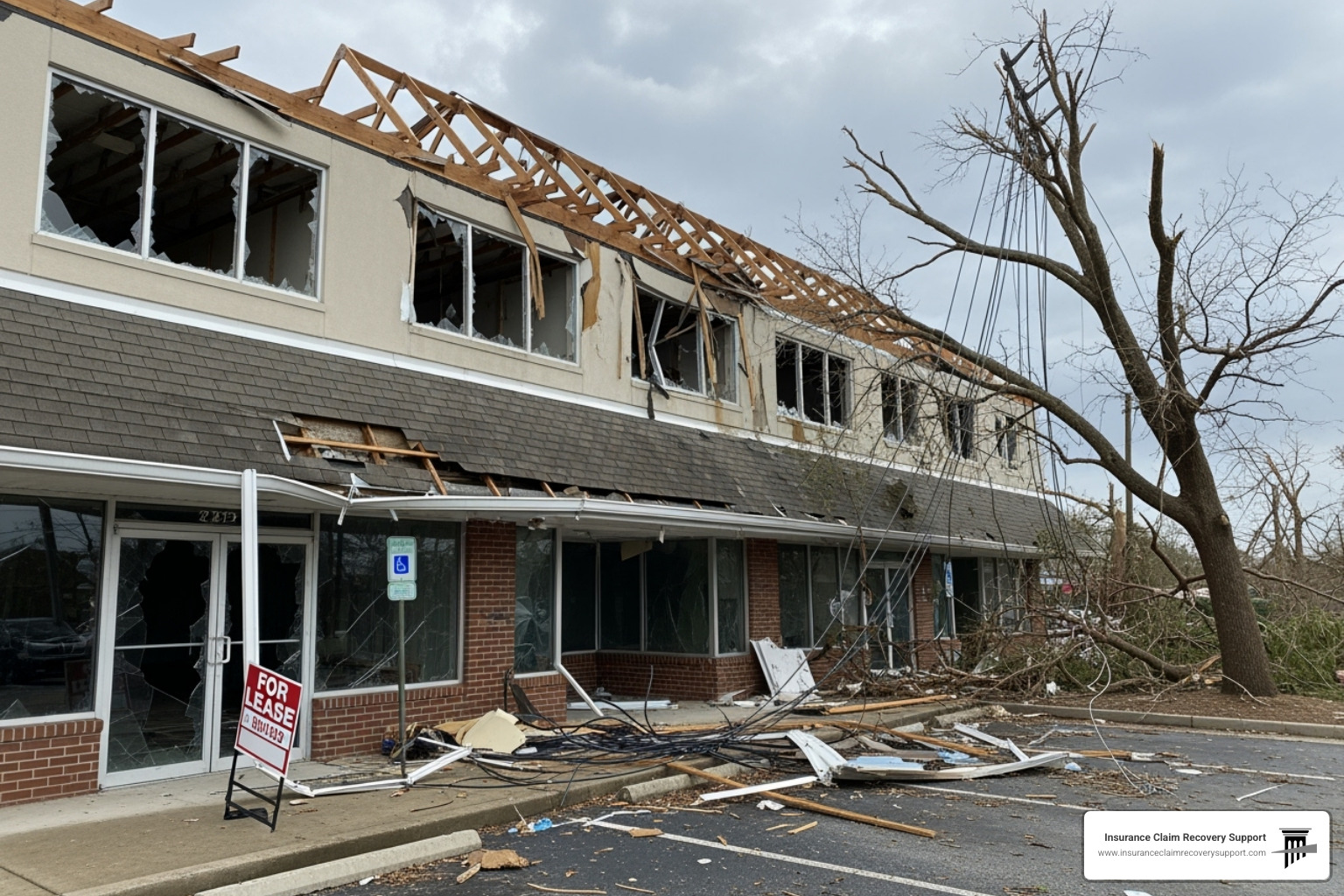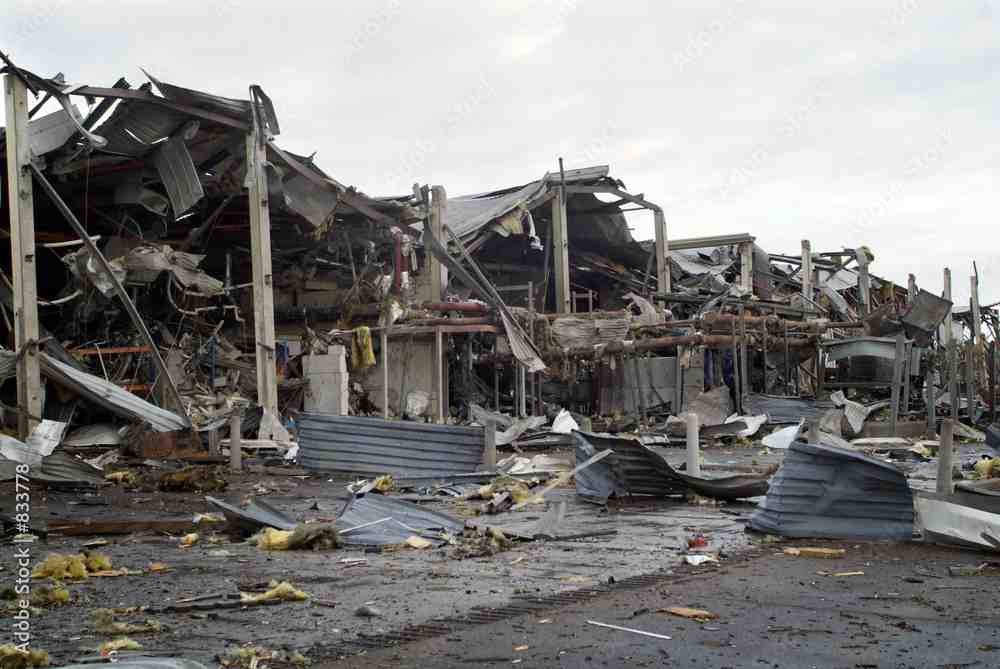Your Legal Rights When Insurance Companies Act in Bad Faith
Can you sue your insurance company? Yes, you absolutely can sue your insurance company in the United States when they fail to honor their contractual obligations or act in bad faith. However, litigation should be your last resort after exploring more cost-effective alternatives.
Quick Answer: When You Can Sue Your Insurance Company
- Bad faith practices – Unreasonable claim denials or delays
- Breach of contract – Failing to pay covered claims
- Negligent claims handling – Inadequate investigation or processing
- Unfair settlement practices – Offering unreasonably low payouts
- Failure to defend – Not representing you when required by policy
For commercial and multifamily property owners in Texas and other states dealing with fire, hail, hurricane, tornado, freeze, lightning, or flood damage, understanding your legal options is crucial. When insurance companies wrongfully deny claims, delay payments without valid reasons, or offer settlements far below actual damages, you have grounds for legal action.
The reality is stark: over 90% of insurance lawsuits settle before trial, often taking several years and costing significant attorney fees. This adversarial process can drain your resources while your damaged property remains unrepaired.
A smarter first step? Hiring a public adjuster who works exclusively for you – not the insurance company. Public adjusters can often resolve disputes without unnecessary litigation, maximizing your settlement while avoiding the time, cost, and uncertainty of a lawsuit.
I’m Scott Friedson, a multi-state licensed public adjuster who has settled over $250 million in commercial property damage claims, often avoiding unnecessary litigation through strategic claim advocacy. Throughout my career handling 500+ large loss claims, I’ve seen how the right approach can turn wrongfully denied claims into full settlements without ever stepping foot in a courtroom.
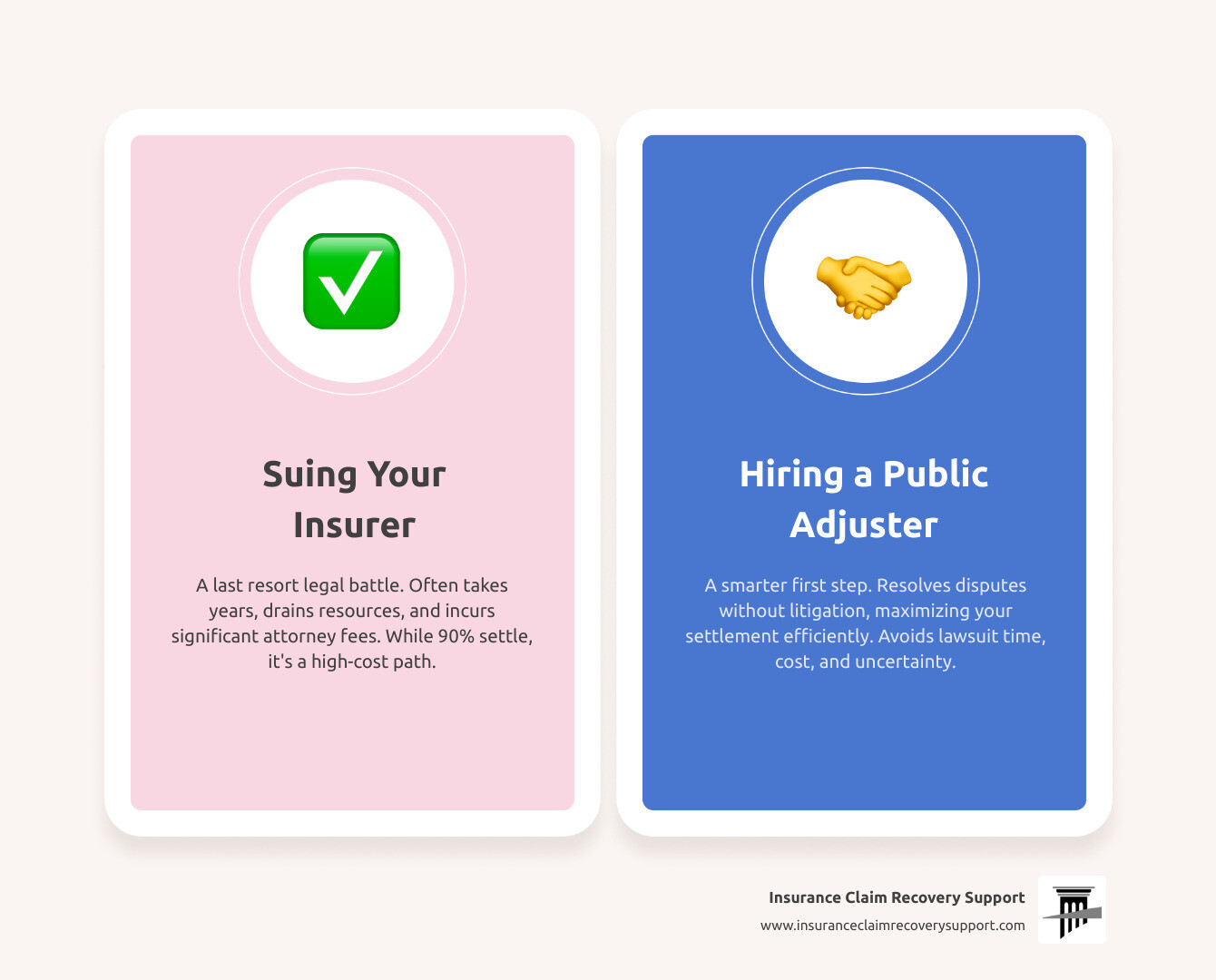
Know your can you sue your insurance company terms:
Understanding Your Right to Sue: When Is Legal Action Justified?
When your commercial building, multifamily property, apartment complex, or religious institution suffers damage from fire, hurricane, tornado, lightning, freeze, or flood, you’re counting on your insurance company to honor their commitment. You’ve faithfully paid your premiums, sometimes for years, trusting that safety net would be there when disaster strikes.
Here’s the reality: your insurance policy is a contract—a legally binding agreement where the insurer promises to cover your losses according to the terms you both agreed upon. When they fail to uphold their end of this bargain, or when they handle your claim unfairly, you have every right to ask: can you sue your insurance company?
The answer is absolutely yes. But understanding when legal action is truly justified can save you time, money, and frustration down the road.
As Policyholder Advocates, we’ve seen countless commercial property owners across Texas—from Austin and Dallas-Fort Worth to Houston, San Antonio, and smaller cities like Lubbock, Waco, and Georgetown—face situations where their insurers fell short of their obligations. Whether you’re dealing with Fire Damage or filing a Storm Damage Insurance Claim, you have clear rights as a policyholder.
Your insurer has specific duties: investigating your claim promptly and fairly, communicating openly about their findings, and ultimately paying legitimate claims according to your policy terms. When these duties are breached—or when they engage in dishonest or unreasonable practices—it’s time to consider your legal options.
But here’s what many property owners don’t realize: litigation isn’t your only option, and it’s rarely your best first move. A skilled public adjuster can often resolve disputes without ever setting foot in a courtroom, saving you years of legal battles while maximizing your settlement.
What are the legal grounds if you can sue your insurance company?
If you’re in a dispute with your insurance company over a commercial property claim, there are several specific legal grounds that may justify a lawsuit. Understanding these can help you determine whether you have a strong case—or whether other approaches might serve you better.
- Breach of contract is the most straightforward reason to sue your insurance company. Since your policy is a contract, when the insurer fails to pay a covered claim, delays payment without reasonable cause, or refuses to honor terms explicitly stated in your policy, they’ve broken their promise. This is the foundation of most insurance lawsuits.
- Bad faith insurance practices represent a more serious violation. Bad faith goes beyond simply breaching the contract—it implies intentional wrongdoing or dishonest behavior. According to Cornell Law School’s legal definition, bad faith includes “dishonest belief or purpose, untrustworthy performance of duties, neglect of fair dealing standards, or fraudulent intent.”
- Unfair claims settlement practices are prohibited under Texas law and include misrepresenting policy provisions, failing to respond to communications promptly, not explaining claim denials adequately, or forcing policyholders to sue by offering substantially less than what they ultimately deserve.
- Negligent claims handling involves the insurance company failing to exercise reasonable care in processing your claim, leading to damages. This requires proving the insurer owed you a duty of care, breached that duty, and directly caused your losses through their negligence.
The key insight here? A public adjuster can often address these issues without litigation. By building a comprehensive evidence package and negotiating directly with the insurer, we can frequently resolve disputes that might otherwise lead to costly lawsuits.
Common Reasons Insurers Deny Commercial Property Claims
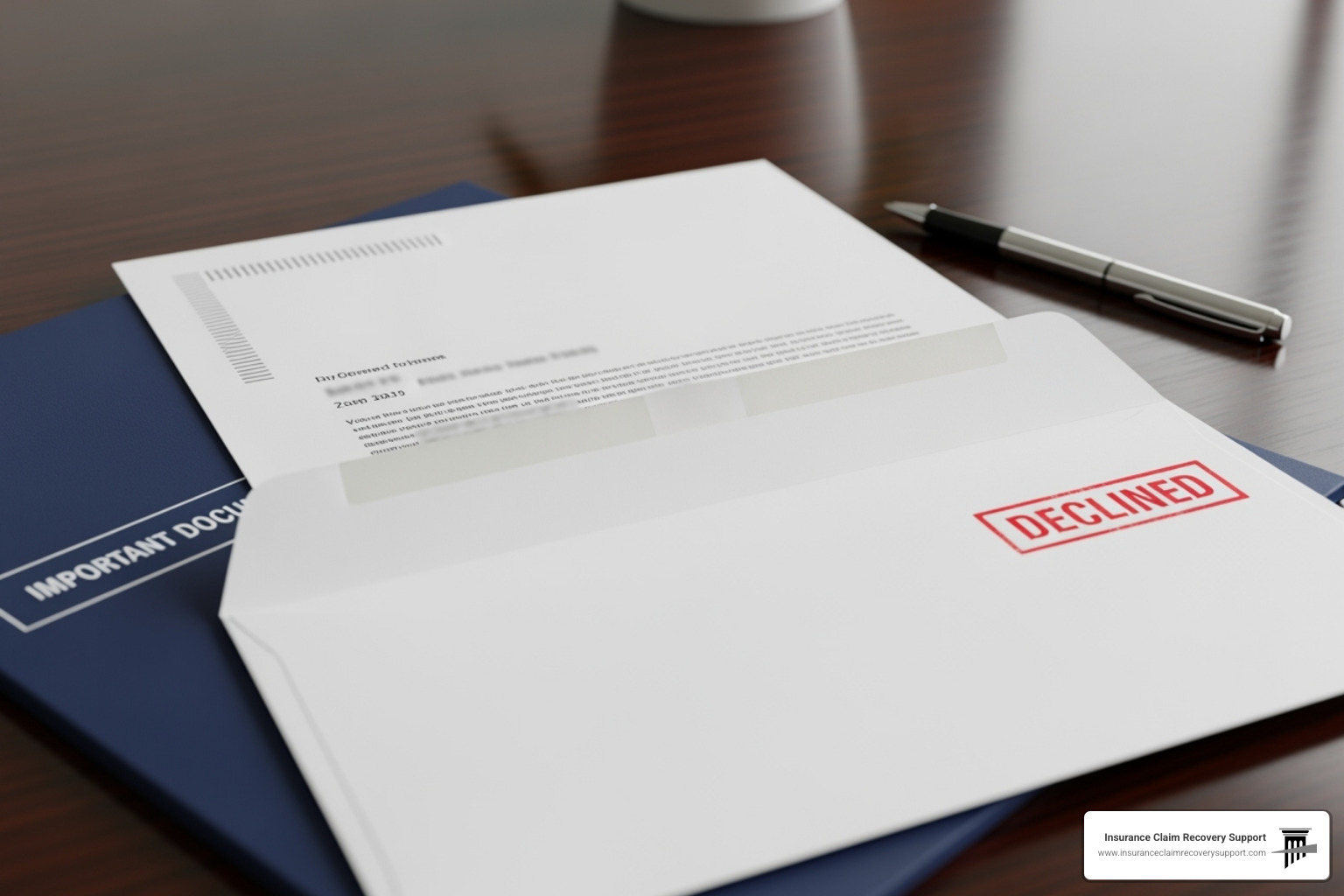
Receiving a claim denial letter after significant property damage is one of the most frustrating experiences for any commercial property owner. While some denials have legitimate basis, many others are questionable at best—and some are outright bad faith.
Understanding why insurers commonly deny claims can help you prepare a stronger case, whether you’re working with a public adjuster or considering legal action.
Coverage disputes top the list, where insurers claim your specific type of damage isn’t covered under your policy. They might argue that flood damage requires separate coverage, or that certain types of mold aren’t included in your standard policy. These disputes often come down to policy interpretation—an area where public adjusters excel.
Policy exclusions present another common challenge. Your insurer might point to exclusions for earth movement, damage during vacancy periods, or specific weather-related events. Sometimes these exclusions are legitimate; other times, they’re misapplied to avoid paying valid claims.
Application errors or alleged misrepresentation occur when insurers claim information in your original application was inaccurate or misleading. This can affect their willingness to honor the policy or influence the premium calculations.
Failure to mitigate damages becomes an issue when insurers argue you didn’t take reasonable steps to prevent further damage. For example, if you didn’t board up windows after storm damage or failed to address a small leak before it became a major flood, they might deny portions of your claim.
Late reporting can trigger denials when claims aren’t reported within what insurers consider a “reasonable” timeframe. Most policies require prompt notification, and delayed reporting can supposedly impair their ability to investigate properly.
Insufficient documentation represents one of the biggest reasons for claim denials or underpayments. Without adequate proof of damage, its cause, and repair costs, insurers will often deny claims entirely. This is exactly why following the Dos and Don’ts of Commercial Property Insurance Claims is so crucial.
Disputed cause of loss happens when insurers argue damage was caused by something not covered, or by pre-existing conditions, rather than the covered event you’re claiming.
Here’s the concerning part: sometimes these stated reasons are disguised bad faith denials. Insurers might claim insufficient evidence or cite policy exclusions when their real intent is simply to avoid paying a valid claim.
This is where a public adjuster becomes invaluable. Rather than accepting a denial and heading straight to court, a skilled public adjuster can challenge these decisions, provide additional documentation, and negotiate directly with the insurer. We’ve seen countless cases where proper claim advocacy turned wrongful denials into full settlements—without the time, expense, and uncertainty of litigation.
The Pre-Lawsuit Playbook: Crucial Steps for Property Owners
Before you even consider whether you can you sue your insurance company, there’s a strategic roadmap every commercial property owner should follow. Think of these steps as building your foundation—whether you ultimately need to pursue litigation or find resolution through other means, this groundwork is absolutely essential.

The reality is that many commercial property owners in Texas cities like Austin, Dallas-Fort Worth, San Antonio, and Houston rush into considering legal action without taking these crucial preliminary steps. This approach often backfires, weakening their position and potentially costing them thousands in unnecessary legal fees. Furthermore, not all states have pro-policyholder consumer protection laws, so before you even purchase a property or find yourself in the middle of a confrontational insurance claim dispute, it’s important to know your rights.
Start by reviewing your policy thoroughly. I know, I know—insurance policies aren’t exactly beach reading. But this document is your contract, and understanding your coverage limits, deductibles, and exclusions is vital. Pay special attention to your duties as a policyholder, including reporting deadlines and mitigation requirements. Here’s something that works in your favor: when policy language is ambiguous, courts typically interpret it in favor of the policyholder, not the insurer.
Documentation is your best friend throughout this entire process. Keep meticulous records of every conversation with your insurance company—dates, times, adjuster names, what was discussed, and any promises made. Save all emails, letters, and policy documents. Take comprehensive photos and videos of the damage before making any repairs. Keep receipts for everything: temporary repairs, lost income, expert fees, even your time spent dealing with the claim.
Put everything in writing. Phone calls are convenient, but they don’t create the paper trail you’ll need if disputes arise. Always follow up important conversations with an email summarizing what was discussed and agreed upon. This simple step has saved countless commercial property owners from “he said, she said” situations.
When your claim is denied or severely underpaid, send a formal demand letter detailing the damage, referencing your policy terms, explaining why the denial is wrongful, and demanding a specific settlement amount. This formal communication often prompts insurers to take a second, more serious look at your claim.
Don’t skip your insurance company’s internal appeal process. Yes, it might feel like asking the fox to guard the henhouse, but using this process demonstrates your good faith effort to resolve issues without litigation—something courts appreciate.
Consider filing a complaint with the Texas Department of Insurance (TDI). While TDI doesn’t typically resolve large-dollar commercial disputes, a complaint creates an official record of the insurer’s conduct and sometimes motivates them to review your case more carefully.
These steps align perfectly with our 9 Tips for Settling Disaster Insurance Claims and significantly strengthen your position regardless of which path you ultimately choose.
The Smartest First Step: Engaging a Public Adjuster
Here’s what I’ve learned after settling over $250 million in commercial property damage claims: the single smartest move commercial and multifamily property owners can make—even before wondering can you sue your insurance company—is engaging a public adjuster who works exclusively for them.
Think about it this way: when your building suffers fire, hurricane, tornado, lightning, freeze, or flood damage, you’re suddenly thrust into a complex negotiation with a billion-dollar insurance company. Their adjuster shows up with years of training, specialized software, and one primary goal: minimizing what they pay you. Repair vs. Replacement disputes are common between policyholders and insurers. Meanwhile, you’re dealing with property damage, business disruption, and trying to figure out insurance policy language that would challenge a law school graduate.
A public adjuster levels this playing field completely. We work solely for you—not the insurance company. Our success depends entirely on maximizing your settlement, which means our interests are perfectly aligned with yours.
Here’s how policyholder advocacy works in practice: We prepare a comprehensive claim evidence package that documents every aspect of your loss. This isn’t just taking a few photos and hoping for the best. We use specialized software, industry knowledge, and forensic techniques to ensure nothing is overlooked—not the hidden water damage behind walls, not the business income losses, not the code upgrade requirements.
Accurate damage valuation is where public adjusters really shine. Insurance company adjusters often miss or undervalue damages. We know exactly what to look for and how to properly document it. We speak the same technical language as the insurance company, but we’re using that knowledge to advocate for you instead of against you.
The negotiation process becomes entirely different when you have professional representation. Instead of you trying to argue with trained insurance professionals, it becomes a conversation between experts—except one expert (us) is fighting exclusively for your interests.
Most importantly, public adjusters often avoid litigation entirely. By presenting thoroughly documented, accurately valued claims and negotiating aggressively from a position of strength, we frequently resolve disputes that might otherwise end up in court. This saves you enormous amounts of time, stress, and legal fees while often achieving better results than unnecessary or avoidable litigation would provide.
If you’re wondering Should I Hire a Public Adjuster? or want to learn more about our Public Adjusting Services, I encourage you to explore these resources. For commercial properties specifically, understanding Why You Need a Public Adjuster for Commercial Claims can be eye-opening.
Exploring Alternatives: Mediation and Appraisal
Before jumping into the litigation pool, smart commercial property owners explore Alternative Dispute Resolution (ADR) methods. These approaches can often achieve satisfactory results without the time, expense, and adversarial nature of a lawsuit.
Mediation involves bringing in a neutral third party—the mediator—who helps you and the insurance company work toward a settlement. The mediator doesn’t make binding decisions but facilitates productive communication and helps both sides understand each other’s positions. What makes mediation particularly attractive is that it maintains a collaborative rather than combative atmosphere.
Here’s an interesting fact: even when lawsuits are filed, over 90% eventually settle before reaching trial, often through mediation or negotiation. So why not try mediation first and potentially save months or years of legal proceedings?
The appraisal process is another tool that can be used when you and your insurer agree that damage is covered but disagree on the dollar amount. Many commercial property policies include an “appraisal clause” that allows either party to demand this process. Be warned though…there are no licensing requirements for appraisers or umpires, there are very few rules of the road to compel an appraisal panel to perform, the appraisal panel is supposed to be made up of competent and impartial parties, often the appraisal process takes just as long if not longer than litigation, the consumer protection statutes that typcially exist in many states for bad faith claim handling practices may no longer enforceable in appraisal, even if an appraisal award is made insurance companies typically reserve the right to deny the award, the fees for the Appraiser and umpire are not recoverable, appraisers and umpires can only work hourly or for a flat rate they are not allowed to work on contingency, and statue of limitations in your policy typcially do not stop once you’re in appraisal. Bottom line in my opinion, the policyholder is better served working with licensed professionals.
Here’s how appraisal works: each side selects an appraiser, and these two appraisers choose an umpire. The appraisers independently estimate your loss, and if they disagree, the umpire resolves the differences. Any decision agreed upon by two of the three participants becomes binding on both parties.
The cost-effectiveness of appraisal compared to litigation is significant. Instead of paying attorneys for months or years of legal proceedings, you’re typically looking at a process that resolves in weeks or months. You can learn more about Loss Types: Appraisal and how it applies to your specific situation.
Both mediation and appraisal offer non-binding (mediation) or binding (appraisal) alternatives that preserve business relationships while resolving disputes efficiently. They’re particularly effective when combined with strong public adjuster representation, as we can present your case professionally in these forums while avoiding the uncertainty and expense of full litigation.
Lawsuit vs. Public Adjuster: Choosing the Right Path for Your Property Damage Claim
When your commercial building, multifamily HOA, apartment complex, or religious institution suffers significant property damage, you face a critical decision. Should you pursue a lawsuit against your insurance company, or is there a better path forward? For property owners and managers dealing with fire, hurricane, tornado, lightning, freeze, or flood damage claims, understanding these two approaches can save you time, money, and considerable stress.
The reality is stark: can you sue your insurance company when they wrongfully deny or underpay your claim? Absolutely. But litigation should be your last resort, not your first move. Let’s examine why a proactive approach with a public adjuster often delivers better results than the reactive path of a lawsuit.
| Factor | Lawsuit Against Insurance Company | Hiring a Public Adjuster |
|---|---|---|
| Process | Adversarial legal battle with depositions, motions, and court proceedings. You’re fighting against the insurer’s legal team. | Collaborative approach focused on maximizing your settlement through expert claim preparation and negotiation. |
| Timeline | Several months to years. Court backlogs and legal procedures create lengthy delays while your property remains unrepaired. | Typically 30-90 days for most commercial claims. Public adjusters work on your timeline, not the court’s schedule. |
| Cost | Attorney fees (often 33-40% of recovery), court costs, expert witness fees, and litigation expenses that can reach tens of thousands. | Public adjuster fee only (typically 5-15% of settlement), with no upfront costs or hidden expenses. |
| Control | Limited control once litigation begins. Attorneys and courts drive the process, with settlement decisions often made under pressure. | You maintain full control over decisions while benefiting from expert advocacy and negotiation on your behalf. |
| Typical Outcome | Over 90% settle before trial, often for amounts that could have been achieved through skilled negotiation without litigation costs. | Maximized settlements through thorough documentation and expert negotiation, typically exceeding initial offers by 20-400%+. |
The fundamental difference lies in approach: lawsuits are reactive – you’re responding to the insurance company’s denial or underpayment after the fact. Public adjusters are proactive – they work from day one to present your claim in the strongest possible light, often preventing disputes before they escalate to litigation.
Consider this: when you sue your insurance company, you’re essentially admitting that the initial claim process failed. You’re now paying attorney fees to fight for money you should have received in the first place. A skilled public adjuster focuses on settlement, not legal victory. Their goal is getting you the maximum payout under your policy terms, allowing you to rebuild and move forward with your business.
The numbers speak volumes. While litigation drags on for years with uncertain outcomes, public adjusters typically resolve commercial property claims in a fraction of the time. You can Find the Difference a Good Public Insurance Adjuster Can Make Settling Your Property Damage Insurance Claim by comparing actual settlement amounts and timeframes.
For commercial and multifamily property owners, time truly is money. Every day your property sits damaged or underrepaired costs you rental income, business revenue, and market value. Public adjusters understand this urgency and work within your business timeline, not the court’s calendar.
The choice becomes clear when you consider that most insurance disputes stem from inadequate claim preparation and presentation, not actual policy coverage issues. A public adjuster addresses these root causes upfront, often eliminating the need for legal action entirely. Learn more about How to Settle Property Damage Insurance Claims through expert advocacy rather than adversarial litigation.

